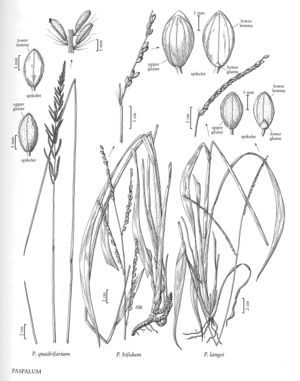Difference between revisions of "Paspalum langei"
FNA>Volume Importer |
FNA>Volume Importer |
||
| Line 17: | Line 17: | ||
-->{{Treatment/Body | -->{{Treatment/Body | ||
|distribution=Okla.;Fla.;Tex.;La. | |distribution=Okla.;Fla.;Tex.;La. | ||
| − | |discussion=<p>Paspalum langei is native from Texas to Florida, and extends through Mexico to Venezuela and the Antilles. It grows at the edges of moist woods and in disturbed areas.</p> | + | |discussion=<p><i>Paspalum langei</i> is native from Texas to Florida, and extends through Mexico to Venezuela and the Antilles. It grows at the edges of moist woods and in disturbed areas.</p> |
|tables= | |tables= | ||
|references= | |references= | ||
| Line 26: | Line 26: | ||
-->{{#Taxon: | -->{{#Taxon: | ||
name=Paspalum langei | name=Paspalum langei | ||
| − | |||
|authority=(E. Fourn.) Nash | |authority=(E. Fourn.) Nash | ||
|rank=species | |rank=species | ||
| Line 33: | Line 32: | ||
|basionyms= | |basionyms= | ||
|family=Poaceae | |family=Poaceae | ||
| − | |illustrator=Linda A. Vorobik | + | |illustrator=Linda A. Vorobik;Cindy Roché |
| + | |illustration copyright=Utah State University | ||
|distribution=Okla.;Fla.;Tex.;La. | |distribution=Okla.;Fla.;Tex.;La. | ||
|reference=None | |reference=None | ||
| Line 39: | Line 39: | ||
|publication year= | |publication year= | ||
|special status= | |special status= | ||
| − | |source xml=https:// | + | |source xml=https://jpend@bitbucket.org/aafc-mbb/fna-data-curation.git/src/f50eec43f223ca0e34566be0b046453a0960e173/coarse_grained_fna_xml/V25/V25_1473.xml |
|subfamily=Poaceae subfam. Panicoideae | |subfamily=Poaceae subfam. Panicoideae | ||
|tribe=Poaceae tribe Paniceae | |tribe=Poaceae tribe Paniceae | ||
Revision as of 20:34, 16 December 2019
Plants perennial; cespitose. Culms 23-125 cm, erect; nodes glabrous or pubescent. Sheaths glabrous or pubescent; ligules 0.6-1.9 mm; blades to 38 cm long, 4-18 mm wide, flat, glabrous or pubescent, dark green. Panicles terminal, with 1-3(4) racemosely arranged branches; branches 2.3-13.4 cm, erect to divergent, terminating in a spikelet; branch axes 0.2-1 mm wide, glabrous, margins scabrous. Spikelets 2.1-3.3 mm long, 1.3-1.6 mm wide, paired, imbricate, appressed to the branch axes, elliptic to obovate, stramineous to brown. Lower glumes 0.4-1.2(1.8) mm, stramineous to brown; upper glumes with papillose-based short pubescence, 3- or 5-veined, margins entire, lower lemmas with papillose-based short pubescence, lacking ribs over the veins, 3-veined, margins entire; upper florets light stramineous. Caryopses 1.3-1.5 mm, light to dark brown. 2n = 40, 60.
Distribution
Okla., Fla., Tex., La.
Discussion
Paspalum langei is native from Texas to Florida, and extends through Mexico to Venezuela and the Antilles. It grows at the edges of moist woods and in disturbed areas.
Selected References
None.
